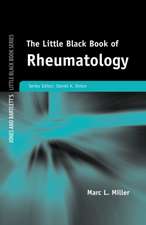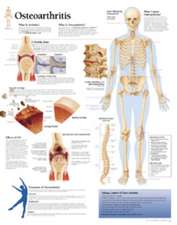Psychological Aspects of Rheumatoid Arthritis: Recent Research in Psychology
Autor Mary L. Pritcharden Limba Engleză Paperback – 11 oct 1989
Din seria Recent Research in Psychology
- 15%
 Preț: 632.37 lei
Preț: 632.37 lei -
 Preț: 379.86 lei
Preț: 379.86 lei -
 Preț: 377.73 lei
Preț: 377.73 lei - 15%
 Preț: 631.40 lei
Preț: 631.40 lei -
 Preț: 382.36 lei
Preț: 382.36 lei - 15%
 Preț: 635.65 lei
Preț: 635.65 lei - 15%
 Preț: 642.36 lei
Preț: 642.36 lei - 15%
 Preț: 634.18 lei
Preț: 634.18 lei -
 Preț: 392.60 lei
Preț: 392.60 lei - 15%
 Preț: 637.59 lei
Preț: 637.59 lei - 15%
 Preț: 635.65 lei
Preț: 635.65 lei - 15%
 Preț: 634.49 lei
Preț: 634.49 lei - 15%
 Preț: 645.47 lei
Preț: 645.47 lei - 20%
 Preț: 440.21 lei
Preț: 440.21 lei - 15%
 Preț: 653.33 lei
Preț: 653.33 lei - 5%
 Preț: 712.60 lei
Preț: 712.60 lei - 15%
 Preț: 634.68 lei
Preț: 634.68 lei - 18%
 Preț: 950.96 lei
Preț: 950.96 lei - 15%
 Preț: 639.59 lei
Preț: 639.59 lei - 15%
 Preț: 634.00 lei
Preț: 634.00 lei - 15%
 Preț: 636.80 lei
Preț: 636.80 lei - 18%
 Preț: 724.00 lei
Preț: 724.00 lei - 15%
 Preț: 642.18 lei
Preț: 642.18 lei - 15%
 Preț: 635.15 lei
Preț: 635.15 lei - 15%
 Preț: 639.08 lei
Preț: 639.08 lei - 15%
 Preț: 638.76 lei
Preț: 638.76 lei - 15%
 Preț: 640.55 lei
Preț: 640.55 lei - 15%
 Preț: 637.28 lei
Preț: 637.28 lei - 15%
 Preț: 630.57 lei
Preț: 630.57 lei - 15%
 Preț: 636.80 lei
Preț: 636.80 lei - 15%
 Preț: 638.57 lei
Preț: 638.57 lei - 15%
 Preț: 633.02 lei
Preț: 633.02 lei - 15%
 Preț: 647.08 lei
Preț: 647.08 lei - 15%
 Preț: 638.43 lei
Preț: 638.43 lei - 15%
 Preț: 649.71 lei
Preț: 649.71 lei - 15%
 Preț: 637.93 lei
Preț: 637.93 lei - 15%
 Preț: 634.18 lei
Preț: 634.18 lei - 15%
 Preț: 632.37 lei
Preț: 632.37 lei -
 Preț: 376.80 lei
Preț: 376.80 lei - 15%
 Preț: 644.18 lei
Preț: 644.18 lei - 15%
 Preț: 640.55 lei
Preț: 640.55 lei - 15%
 Preț: 637.78 lei
Preț: 637.78 lei -
 Preț: 377.57 lei
Preț: 377.57 lei - 15%
 Preț: 635.15 lei
Preț: 635.15 lei - 18%
 Preț: 946.87 lei
Preț: 946.87 lei - 15%
 Preț: 647.27 lei
Preț: 647.27 lei - 15%
 Preț: 633.53 lei
Preț: 633.53 lei
Preț: 637.13 lei
Preț vechi: 749.56 lei
-15% Nou
Puncte Express: 956
Preț estimativ în valută:
121.91€ • 127.65$ • 101.12£
121.91€ • 127.65$ • 101.12£
Carte tipărită la comandă
Livrare economică 09-23 aprilie
Preluare comenzi: 021 569.72.76
Specificații
ISBN-13: 9780387971162
ISBN-10: 0387971165
Pagini: 208
Ilustrații: XV, 208 p.
Dimensiuni: 155 x 235 x 12 mm
Greutate: 0.33 kg
Ediția:1989
Editura: Springer
Colecția Springer
Seria Recent Research in Psychology
Locul publicării:New York, NY, United States
ISBN-10: 0387971165
Pagini: 208
Ilustrații: XV, 208 p.
Dimensiuni: 155 x 235 x 12 mm
Greutate: 0.33 kg
Ediția:1989
Editura: Springer
Colecția Springer
Seria Recent Research in Psychology
Locul publicării:New York, NY, United States
Public țintă
ResearchCuprins
1 Introduction.- Rheumatoid Arthritis.- Psychological Issues in Rheumatoid Arthritis.- Plan of the Book.- 2 Psychological Distress in Rheumatoid Arthritis.- Incidence and Nature of Distress.- Explaining Psychological Distress in Rheumatoid Arthritis — Response or Antecedent?.- Predictors of Psychological Distress in Rheumatoid Arthritis.- Positive Reactions to Illness.- 3 Compliance with Medical Advice.- Incidence of Non-Compliance.- Problems with Compliance Research.- Factors Associated with Compliance.- Patient Knowledge.- 4 Unorthodox Treatment Use.- Limitations of Research on Unorthodox Treatment Use.- Why Do People Turn To Unorthodox Treatments?.- The Dimensionality of Unorthodox Treatment Use.- 5 Pilot Study 1 — An Exploration of Psychological Issues in Rheumatoid Arthritis.- Method.- Results and Discussion.- 6 Patients’ Knowledge and Misconceptions about their Illness.- Pilot Study 2.- Conclusions.- Postal Questionnaire Study.- 7 Methodology of the Main Correlational Study.- Subjects.- Interview Schedule.- Questionnaires.- Statistical Analyses.- 8 Psychological Distress — Results and Discussion.- Incidence, Severity and Nature of Psychological Distress.- The Dimensionality of Distress.- Relationship of Adjustment and Demographic Variables.- Disease Variables and Adjustment.- Control and Adjustment.- Illness Knowledge and Adjustment.- Feelings about Conventional Medical Treatment and Adjustment.- Positive Effects of Illness.- Summary.- 9 Compliance with Conventional Medical Treatment — Results and Discussion.- Incidence of Non-Compliance.- The Dimensionality of Compliance.- Pain Locus of Control and Compliance.- Psychological Adjustment and Compliance.- Demographic Variables and Compliance.- Illness Knowledge, Health Beliefs and Compliance.- Summary.- 10Use of Unorthodox Treatments — Results and Discussion.- Amount and Type of Use.- The Reasons Patients Gave for Trying Unorthodox Treatments.- The Dimensionality of Unorthodox Treatment Use.- Disease Variables and Unorthodox Treatment Use.- Psychological Distress and Use of Unorthodox Treatments.- Positive Effects of Illness and Unorthodox Treatment Use.- Pain Locus of Control and Unorthodox Treatment Use.- Conventional Medical Treatment and Unorthodox Treatment Use.- The Sophistication Hypothesis of Unorthodox Treatment Use.- Demographic Variables and Unorthodox Treatment Use.- Summary.- 11 Conclusions.- References.












